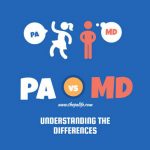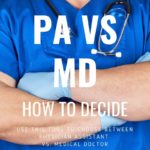
Physician Assistants/Associates (PAs) are amazing professionals who can do many things, but there are some things we cannot do (nor do we want to ?).
In this blog post, I will outline what a PA is and what we are not. So, if you are curious about PAs or want to know what we can and cannot do, read on!
What Physician Assistants Are
Physician assistants are professionals who diagnose, treat, and help prevent illnesses.
Physician assistants are authorized to work independently of physicians, with supervision from a licensed physician or surgeon. State regulations determine the scope of supervision of PAs by physicians.
Physician assistants are trained to provide primary care in the office, hospital, school, or clinic setting.
In the United States, physician assistants are called PAs (this is more than just an acronym), and we are also called physician associates - depending on who you ask!
Physician assistants are medical providers who have duties that may include taking medical histories and physical examinations; ordering x-rays and other tests; interpreting test results; diagnosing diseases; counseling patients on general health issues such as nutrition, exercise, or stress management; writing prescriptions for medications or surgical procedures when qualified to do so by experience or training; prescribing medication when authorized by law to do so in the course of their job duties; performing physical therapy if qualified to do so by training or experience.
Physician assistants can assist surgeons during surgery.
PAs can prescribe medications in all fifty states.
Physician assistants are educated in a master’s or doctorate program accredited by the Accreditation Review Commission on Education for the Physician Assistant (ARC-PA).
PAs are part of a healthcare team that includes physicians, nurses, and other medical professionals who work together to provide high-quality care for their patients.
Physician assistants are limited to a scope of practice determined by state law and may vary depending on the setting in which they work.
Certified physician assistants are PAs who have passed a national certification exam, the Physician Assistant National Certifying Exam (PANCE), and have been certified. PAs who are certified receive the designation of PA-C.
Physician assistants can be licensed but not certified - they need to pass their certification exam to be certified. PAs can work without certification but will face few options.
PAs are lifelong learners, and maintaining certification requires one hundred continuing medical education (CME) credits every two years and recertification examinations, the Physician Assistant National Recertification Exam (PANRE) every ten years. PA certification maintenance mirrors the physician certification maintenance process.
PAs must complete training at an accredited institution to be licensed as a PA.
Physician assistants and PA-like medical workers (nonphysician clinicians) that function under the supervision of a doctor are working all around the world in various capacities and go by different names.
Physician assistants are eligible for certification as Medicare and Medicaid providers.
Physician assistants are well compensated and have one of the best jobs in America.
PAs are able to change specialties throughout our careers, and we do not need to acquire a new certification to do so.
Although PAs pass a National Certifying Exam, we must satisfy requirements dictated by the state where we wish to practice and apply, pay additional fees, and submit documentation to obtain (and maintain) state licensure.
What Physician Assistants Are Not
Physician assistants are not medical doctors, nor do we want to be.
Physician assistants are not independent practitioners, and we cannot independently practice medicine without a licensed physician being involved in our work.
Physician assistants are not physician's assistants. Ever!
PAs are not mid-level providers, physician extenders, or non-physician providers. These phrases are not only hurtful to PAs but also out of date and should be avoided.
While physician assistants can do many things, they cannot perform all the duties of a medical doctor. For example, physician assistants can assist in surgery, but we cannot perform surgery.
Physician assistants do not become PAs as a stepping stone on their path to becoming medical doctors.
PAs are not unhappy being called physician assistants unless they have a fragile ego, in which case they should have become doctors.
Though we share similar duties in certain situations, physician assistants are not the same as nurse practitioners.
PAs are not advanced practice providers or advanced practice clinicians: Grouping PAs with other providers should be avoided. These terms are problematic, as they are imprecise and applied inconsistently.
PAs are not required to choose a specialty area of practice during (or after) PA school.
Physician assistants are not required to complete a residency program to practice in a given specialty.
Physician assistants are not the bosses of anyone. We are part of a team working in collaboration with other medical professionals to provide the best possible care for our patients.
Physician assistants are not required to pass the certification exam on the first try. You get up to six attempts over six years and up to three attempts in a given year.
What PAs Are and Are Not
As you can see, being a physician assistant is a complex topic.
PAs are not medical doctors, assistants to doctors, or just nurse practitioners with a different title. We are physician assistants/associates (PAs) who have chosen to specialize in the practice of medicine and work under the supervision of a licensed physician.
We have a strong focus on the practical application of medical knowledge and are committed to providing the very best care to people from all backgrounds in the communities we serve.
The fact that so much confusion surrounds the role of physician assistants is a reflection of the growing demand for affordable, accessible medical care. No doubt, the future of health care lies in the hands of capable PAs, and it is up to us to navigate this role with intelligence, humility, and tenacity.
If you have any questions about being a physician assistant, the Physician Assistant National Recertification Examination, or anything else related to physician assistants, please feel free to ask in the comments below.














Article is very outdated now.
MT, AZ, WY, ND, and UT all allow for independent practice (typically with over 4000 of employment) of PAs. A slew of others have collaborative agreements removing some of the restrictions.
Can a PA revoke/cancel a prescription written by an MD other than an MD in his/her practice? The prescribing MD is the patients individual PCP and NOT in any way related to the practice which the PA is employed by?
A Physician Assistant (PA) generally does not have the authority to revoke or cancel a prescription written by a medical doctor (MD), especially if the MD is not affiliated with their practice. Prescriptions are typically associated with the provider who wrote them, so only that provider (or someone with direct authority over that provider) could make changes to it.
The primary role of a PA in this situation might be to advise the patient to contact their PCP regarding the medication, or, with the patient’s consent, to reach out to the prescribing MD themselves to express any concerns. If the PA believes the medication is inappropriate or harmful, they could also recommend the patient to discontinue the medication while awaiting further advice from the prescribing MD.
However, policies can vary by region and practice, and it’s always important to follow the legal and ethical guidelines established by relevant professional and regulatory bodies.
– Stephen
There are still many PAs practicing who have a bachelor’s degree, rather than a graduate degree, from an accredited program. The majority of programs did not begin awarding a graduate degree until well into the 2000s when the Master’s degree became the accepted entry level degree.
What difference does this make? It’s a moot point. Bachelor’s degreee, Master’s degree….whatever. The training is the same. One isn’t any better than the other.
“Physician assistants can be licensed but not certified – they need to pass their certification exam to be certified.”
This is inaccurate. ALL states require certification by NCCPA for their initial license. Several do not require maintenance of certification for continued licensure.
May i suggest that it’s important to switch to “PA education”, rather than “PA training”. It’s a subtle but important distinction between level of professionalism knowledge versus technical skills acquisition.
If many CTS (cardiothoracic surgical) PAs perform vein or artery harvesting for CABGs. Many CT surgeons are not even in the OR during this process. Is this still considered assisting in surgery or actually performing a surgical procedure?
In this instance, I would say that the PA is doing both: assisting in surgery and performing a surgical procedure!
Stephen